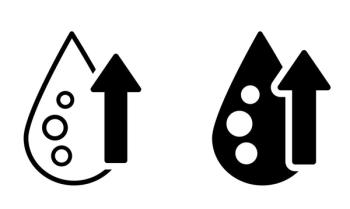
Statin Therapy Linked to Regression of Coronary Atherosclerosis
CLEVELAND -- Statin therapy was associated with a 5% or greater regression of coronary atherosclerosis when LDLs dropped substantially in the face of rising HDLs, researchers reported.
CLEVELAND, Feb. 6 -- Statin therapy was associated with a 5% or greater regression of coronary atherosclerosis when LDLs dropped substantially in the face of rising HDLs, according to researchers here.
These findings, derived from an analysis of four big clinical trials, suggest that statins led to both a reduction in LDLs and an increase of at least 7.5% in HDLs, Stephen Nicholls, M.B.B.S., Ph.D., of the Cleveland Clinic, and colleagues, reported in the Feb. 7 issue of the Journal of the American Medical Association.
"This, to our knowledge, is the first time that increases in HDL-C levels have been shown to be an independent predictor of a beneficial outcome with statin therapy," they said.
Nevertheless, it remains to be seen whether the atherosclerosis regression will translate to meaningful reductions in cardiovascular events, they added.
A large body of evidence supports a central role for lowering LDLs in the prevention of atherosclerotic cardiovascular disease. However, no data exist describing the relationship between statin-induced HDL increases and disease progression, Dr. Nicholls said.
To investigate the relationship between changes in LDL and HDL cholesterol and the atheroma burden in patients with coronary artery disease, the researchers combined the raw data from four prospective randomized trials in the U.S., North America, Europe, and Australia from 1999 to 2005.
In these trials, 1,455 patients (mean age 57.6) with angiographic coronary disease underwent serial intravascular ultrasonography while receiving statin treatment for 18 months or 24 months.
Of the patients 73% were men, 92% were white, the average body mass index was 30; 24% were current smokers, 76% had a history of diabetes, and 19% had a history of diabetes.
The trials included REVERSAL (Reversal of Atherosclerosis With Aggressive Lipid Lowering), CAMELOT (Comparison of Amlopidine vs Enalapril to Limit Occurrence of Thrombosis), ACTIVATE (ACAT Intravascular Atherosclerosis Treatment Evaluation), and ASTEROID (A Study to Evaluate the Effect of Rosuvastatin in Intravascular-Ultrasound Derived Indices of Coronary Atheroma Burden).
During statin therapy, the researchers reported that mean LDL cholesterol levels were reduced 23.5%, (P
With increasing attention focused on the HDL particle, it will be important to further examine the effect that statins have on both HDL and the functional properties of the HDL particle in relation to atheroma progression, the researches said.
The findings also provide further evidence to support previous report that the benefits of statins on plaque progression and clinical events may be derived in part from their anti-inflammatory properties.
The findings also provide further evidence to support the atheroprotective properties of HDL cholesterol and the therapeutic interventions that increase its levels, the researchers said.
The combination of lower LDLs and higher HDLs should be considered in the selection of therapy and the subsequent management of patients with coronary artery disease.
The study's limitations, as noted by the researchers, included the fact that the results represent a post hoc analysis of patients in four different clinical trials. While the individual studies differed in time between baseline and the follow-up ultrasound, it remains to be determined whether atheroma progression with time is linear.
Also, they said, the current findings are derived from patients diagnosed with coronary artery disease and cannot be extrapolated to the setting of primary prevention.
Furthermore, they added, the requirement for an invasive catheterization procedure and other differences raises potential sampling biases for the current analysis.
Finally, they noted that intravascular ultrasonography provides a "suboptimal characterization" of plaque components. Accordingly, it remains uncertain whether simultaneous lowering of LDLs and raising HDLS has an incremental beneficial effect on plaque stabilization with statins.
But perhaps most important, Dr. Nicholls said, it remains to be demonstrated that simultaneous lowering of LDLs and elevation of HDLs translates to fewer clinical events. A large-scale clinical trial would be needed to demonstrate that the beneficial effect on plaque progression results in fewer clinical events, he concluded.
Nevertheless, the current study has implications for the development of lipoprotein-modulating therapies to treat coronary artery disease, the researchers said. If new therapies can produce increases in HDLs much larger than that observed in the current study, they may be able to substantially reduce disease burden, the researchers said.
Although it remains to be determined whether the atherosclerotic regression observed in this study will bring about meaningful reductions in clinical events, the findings suggest that modifying the levels of both detrimental and protective lipids should be an important objective in the management of patients with established coronary artery disease, the investigators concluded.
Co-authors E. Murat Tuzcu, M.D., reported receiving research support from Pfizer, AstraZeneca, and Sankyo Pharma; and honoraria for lectures from Pfizer and AstraZeneca. Ilke Sipahi. M.D., reported receiving an educational grant from Pfizer. Stanley Hazen, M.D., Ph.D., reported receiving research support and honoraria for lectures from Pfizer, Merck, and Sankyo. Adam Grasso., M.D., reported owning stock in Pfizer. Paul Schoenhagen, M.D., reported giving lectures for Takeda Pharmaceuticals but noted that all honoraria were directly paid to charity. Milind Desai, M.D., reported receiving honoraria for lectures from Merck and Pfizer. Samir Kapadia, M.D. reported receiving honoraria for lectures from Pfizer. Dr Nissen reported receiving research support from AstraZeneca, Eli Lilly, Pfizer, Takeda, Sankyo, and Sanofi-Aventis; and consulting for a number of pharmaceutical companies without financial compensation. Dr Nissen's honoraria, consulting fees, or other payments from any for-profit entity are paid directly to charity, so that neither income nor any tax deduction is received.
The REVERSAL and CAMELOT studies were sponsored by Pfizer; the ASTEROID study was sponsored by AstraZeneca; and the ACTIVATE study was sponsored by Sankyo Pharma. However, these sponsors did not provide financial support for this pooled analysis.
Newsletter
Enhance your clinical practice with the Patient Care newsletter, offering the latest evidence-based guidelines, diagnostic insights, and treatment strategies for primary care physicians.

































































































































